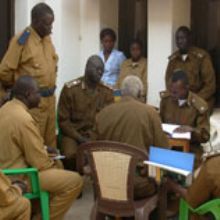UN anti-crime agency start reforming South Sudan prisons
March 26, 2008 (UNITED NATIONS) – In its first project in Sudan, the United Nations Office on Drugs and Crime (UNODC) recently started assisting the Government of South Sudan in its prison reform process in the region as it emerges from two decades-long civil war.
 The project is funded by the Global Peace and Security Fund of the Government of Canada and undertaken in cooperation with the International Centre for Criminal Law Reform and Criminal Justice Policy and the United Nations Mission in Sudan (UNMIS).
The project is funded by the Global Peace and Security Fund of the Government of Canada and undertaken in cooperation with the International Centre for Criminal Law Reform and Criminal Justice Policy and the United Nations Mission in Sudan (UNMIS).
The project follows a specific need identified by the Government of Southern Sudan (GoSS) to help build and strengthen the capacity of prison management to lead the prison reform process.
“This includes enhancing the capacity of the Southern Sudan Prison Service to respond more effectively to the needs and circumstances of children, women and other groups with special needs in prison,” says Mark Shaw, UNODC Inter-Regional Adviser, who leads UNODC’s work in Sudan.
At the invitation of the GoSS and UNMIS, UNODC conducted an exploratory assessment mission to determine the kind of support that could be provided in the area of prison reform. The mission also looked at establishing a longer-term penal reform assistance programme.
At the moment, the prison service functions with almost no reliable information on the prison population and its own staff, Mr. Shaw said. The UNODC website carries a photograph of a wooden board on a prison facility, on which numbers of prisoners had been chalked in by hand.
In order to achieve sustainable reform, the project focuses on three areas: Information management capacity development, Human resource development and Policy development and regulations.
“As a first step, a survey of the current prison population will be carried out to understand its characteristics and the needs of the detainees,” Mr. Shaw stated. A system to manage such information will then be developed.
In addition, senior staff will be trained in issues crucial for prison reform, including administrative procedures, planning, international standards, and responding to the needs of prisoners with special needs, including women, children and the mentally ill.
In order to improve the management of the Prison Service as well as to develop longer-term penal policies focusing on vulnerable groups, UNODC is providing expertise to support the drafting of relevant legal, policy and regulatory frameworks, the agency said.
According to the Comprehensive Peace Agreement signed in 2005, the responsibilities of Government of Southern Sudan include management of the prison service.
(ST)
